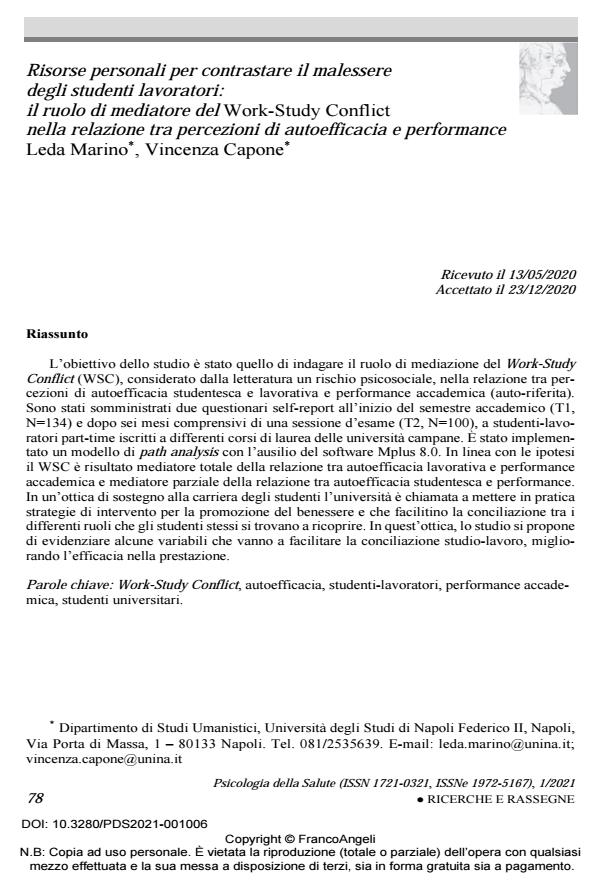The role of personal resources to contrast the working students’ malaise: the mediating role of Work-Study Conflict in the relationship between self-efficacy and performance
Journal title PSICOLOGIA DELLA SALUTE
Author/s Leda Marino, Vincenza Capone
Publishing Year 2021 Issue 2021/1
Language Italian Pages 21 P. 78-98 File size 297 KB
DOI 10.3280/PDS2021-001006
DOI is like a bar code for intellectual property: to have more infomation
click here
Below, you can see the article first page
If you want to buy this article in PDF format, you can do it, following the instructions to buy download credits

FrancoAngeli is member of Publishers International Linking Association, Inc (PILA), a not-for-profit association which run the CrossRef service enabling links to and from online scholarly content.
The aim of the study was to investigate the mediating role of Work-Study Conflict (WSC), as a psychosocial risk, in the relationship between student and work efficacy beliefs and academic performance (self-reported). Two different self-report questionnaires were submitted at the beginning of the academic semester (T1, N=134) and after six months, including an exam session (T2, N=100), to part-time student-workers enrolled in different degree courses of Campanian Universities. A path analysis model was implemented using Mplus 8.0 software. The results highlighted that the WSC was the full mediator of the relationship between work self-efficacy and academic performance and a partial mediator of the relationship between student self-efficacy and performance. With the purpose of supporting students’ career, the university is called to put in practice intervention strategies for the promotion of the conciliation between the different roles. In this perspective, the study highlighted some variables that could facilitate study-work balance, improving academic performance.
Keywords: Work-Study Conflict, efficacy beliefs, working-students, undergraduate students, academic performance.
- Perceived Employability, Academic Commitment, and Competency of University Students During the COVID-19 Pandemic: An Exploratory Study of Student Well-Being Vincenza Capone, Leda Marino, Miriam Sang-Ah Park, in Frontiers in Psychology 788387/2021
DOI: 10.3389/fpsyg.2021.788387 - Self‐perceived employability and entrepreneurial and intrapreneurial intentions: Evidence from six countries Emil Knezović, in Global Business and Organizational Excellence /2024 pp.5
DOI: 10.1002/joe.22205
Leda Marino, Vincenza Capone, Risorse personali per contrastare il malessere degli studenti lavoratori: il ruolo di mediatore del Work-Study Conflict nella relazione tra percezioni di autoefficacia e performance in "PSICOLOGIA DELLA SALUTE" 1/2021, pp 78-98, DOI: 10.3280/PDS2021-001006